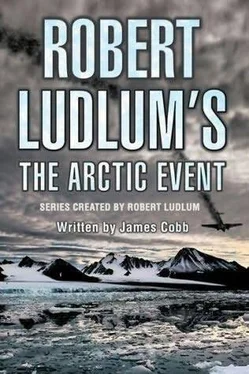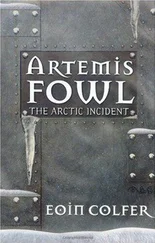“I would say down the coast, Colonel,” Smyslov replied swiftly. “They would need food, and there is nothing to be had here. Along the coast there would be seals and bears. There would also be better opportunities for shelter. The weather up here on the glacier would be too bad.”
Valentina shook her hooded head. “No, I disagree, Gregori. They made their survival camp up here, probably within sight of this aircraft.”
“If they did, it’s pretty well hidden.” Smith returned his binoculars to their case. “And the major makes a pretty good case about the food. What brings you to your conclusion, Val?”
“A number of things,” she replied. “For one, the stripped state of the aircraft. It would take a lot of work and a lot of trips to move all of that material out of the wreck. They wouldn’t have carried it far. For another, they wouldn’t be immediately concerned about food. They would have had emergency rations for at least a couple of weeks, and they weren’t planning to stay around for that long.”
“Would they have had much choice?”
“They thought so, Jon. These people were not planning on setting up housekeeping. They intended to go home. Remember how they pulled the radio and radar systems out of the plane, as well as the auxiliary power unit? They had all of the components and expertise they needed to build one hellaciously powerful radio transmitter, one that could reach halfway around the world, and certainly back to Russia. That’s another reason they’d want to stay up here. The higher elevation would increase their broadcast and reception range.”
“Then why didn’t they use it?” Smith asked.
“I don’t know.” Smith could feel the words the historian didn’t want to speak aloud. He turned toward Smyslov. “What do you think, Major?”
The Russian shook his head. “I must disagree, Colonel. If they had built such a radio, they would have called for rescue. Obviously they did not.”
Whoever had chosen Gregori Smyslov had made one critical error with the man. He could lie well with his mouth, but not with his eyes or body language. The Russian’s words only emphasized a subtle change that had crept into the team’s dynamics overnight. Once more it had become an us-versus-them scenario, with Smyslov standing alone.
And yet, Smith pondered, if it was an us-versus-them, why hadn’t Smyslov simply allowed him to suffocate in the bomb bay the previous afternoon? He’d had a blank check to kill.
“We’ve got to find out which one of you is right, and fast,” Smith continued. “We know the anthrax is in the wreck. We know that someone else positively knows about it. We must assume these individuals are en route to collect it. Given that the hostiles have gone active on the island, we must also assume that we may have only hours before their main body arrives.”
Smyslov spoke up sharply. “Colonel, given the situation, should not we immediately return to the base camp? Our priority must be to resume contact with our superiors.”
There could be no doubt about it. Smyslov wanted not to find that survival camp as urgently as Valentina wanted to locate it, and probably for the same reason.
“A valid point, Major, but we will still make a sweep up here for the aircrew’s survival camp.” Smith extended his hand and swept it from north to south, covering the eastern edge of the glacier. “Granted that Professor Metrace is correct, the crew’s best bet for finding shelter should be along there, the base of East Peak.”
“The camp may have been well drifted over during the last fifty years,” Valentina added, slinging the model 70 over her shoulder. “So I’d suggest watching for shapes, especially straight linear ones, under the surface of the snow.”
“Got it. Any other questions? Okay, let’s move out.” Smith kept his own rifle cradled in his arms as they started the trudge across the ice.
Smith worked to the north, angling across the saddleback to the point where the glacier broke into a wicked blocky tumble of shattered ice, a miniature Beardmore that slumped down the front face of the island to the narrow coastal strip. From that point, according to the plan, they swept back across the gap. Advancing line abreast at twenty-yard intervals, they scouted the broken stone and ice interface along the base of the eastern peak.
Valentina kept to the inside slot, ranging along the bottom of the slope with the eager intensity of a hunting bird dog. Smith took the center point in the line while Smyslov stayed on the outer flank. In addition to watching the glacial surface, Smith found himself covering Val as she worked and eyeing the mountain slopes above for a variety of potential threats: snow cornices, avalanche chutes, and the possibility of camouflaged observers.
He also found himself intermittently watching Gregori Smyslov out of the corner of his eye. Was the Russian looking for something else beyond the remains of the lost aircrew? Who was he waiting for, and what would be the key that would trigger him into action? And what would that action be?
They passed the crash site and climbed the last hundred gently sloping yards to the central ridge of the saddleback. Smith paused for a moment in his trudging advance to survey the greater world.
The sea smoke was closing in around Wednesday once more, the mists lapping at the island’s flanks, killing the horizons and enhancing the unworldly sense of isolation. For a moment the saddleback was a literal island in the sky, sandwiched in a layer of clarity between the fog and the overcast. How long it would last was questionable.
It didn’t really matter. Soon they must break off the search and head back for the station. And maybe just as well. If Val was right, locating the camp of the downed aircrew might be the activation point of the Russian alternate agenda. Maybe it would be wiser to eat this apple one bite at a time, keeping Smyslov as an ally. Deal with the anthrax question first; then force the confrontation.
Smith turned and then stumbled as his right crampon snagged momentarily. Automatically he glanced down at the obstruction.
The spiked toe of his arctic boot had kicked up and exposed a short length of wire, its black insulation crumbling with age and cold.
Smith hesitated for one moment more. It would be easy enough to scrape a boot edge of snow over it and just keep going. But then, not knowing had been at the heart of this crisis from the beginning. Deliberately courting ignorance now simply didn’t make sense. Smith shifted his rifle to his left hand and lifted the right over his head, the fist clinched in the rally signal.
“It’s Soviet,” Smyslov confirmed, kneeling beside the exposed wire. “A trailing antenna. The kind that could be streamed behind an aircraft for long-range communications.”
“Laying an insulated aerial across the ice has been a communications expedient used in polar environments before,” Valentina confirmed.
“But where is the radio set?” Smyslov asked, getting back to his feet. “Where is the camp? There is nothing, only the wire.”
“The easiest way to resolve that question is to follow it.” Smith pointed toward the base of east peak. “Thataway.”
The antenna had melted into the frozen surface like a thread across an ice cube, but the incessant scouring of the winds had kept it buried only a few inches deep. Exposing the antenna as they went, they found that it swept in a shallow curve, having drifted with the flow of the glacier. At one point stress had snapped the thin wire, but the broken end was located only a few feet away. Surprisingly it led toward an almost sheer blank-faced wall of basalt rock, vanishing into the shoulder-high drift of hard-packed snow at its base.
“What the hell?”
Undaunted, Valentina Metrace unslung her pack and rifle and drew her belt knife. Dropping to her knees, she began to tunnel into the drift like an industrious badger. After a moment Smith and Smyslov joined her.
Читать дальше












